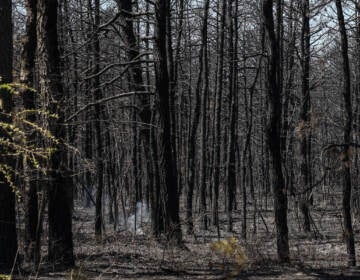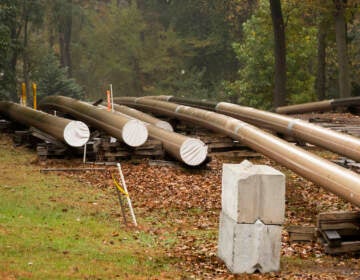BL England decision may doom N.J. pipeline but natural gas projects still on
The demise of the B.L. England power plant appears to doom a 22-mile gas pipeline through the Pinelands to the facility.

Protesters armed with signs fill the bleachers at Pine Belt Arena in Toms River, where the New Jersey Pinelands Commission held a public hearing on the Southern Reliability pipeline through Burlington and Ocean counties. (Emma Lee/WHYY, file)
The demise of the B.L. England power plant appears to doom a 22-mile gas pipeline through the Pinelands to the facility, an outcome widely welcomed by opponents, many of whom favor a moratorium on all new fossil-fuel projects in New Jersey.
“By stopping the fossil fuel plant and rendering the unwarranted pipeline moot, it sets the right course for 100 percent renewables by 2050,’’ said Amy Goldsmith, state director for Clean Water Action, referring to a Murphy administration goal.
Perhaps so. But on the day after RC Cape May Holdings announced it was abandoning plans to repower its coal units with natural gas, New Jersey Natural Gas asked the state to allow it to invest $507 million over five years to enhance the reliability of its gas system.
South Jersey Gas, which had waged a long and expensive battle to build the pipeline to supply fuel to the B.L. England plant, announced it would seek alternative solutions to back up 142,000 customers in Atlantic and Cape May counties with supplies of natural gas, part of the rationale behind the 22-mile pipeline project.
Elizabethtown Gas, also owned by South Jersey Industries, the parent of South Jersey Gas, also wants to spend $500 million to replace old cast-iron gas mains in its system.
Killing off the Pinelands pipeline?
The decision to shut down B.L. England all but kills off the justification for the pipeline’s approval by the Pinelands Commission and New Jersey Board of Public Utilities, according to a letter from the New Jersey Attorney General’s office. The letter Wednesday was addressed to an appellate court judge hearing a case brought by opponents of the pipeline.
The letter suggested a new application for approval of the pipeline would have to come before the two agencies if any of the gas originally directed to the plant is diverted elsewhere. “Right now, without this plant, that pipeline is dead,’’ said Jeff Tittel, director of New Jersey Sierra Club, one of the groups opposing the project in court.
The blocking of both projects would mark a huge win for those who have called on the administration of Gov. Phil Murphy to bar approval of new natural-gas power plants and pipelines. But cheap natural gas has dramatically lowered heating costs for consumers, stabilized high electric bills, and improved prospects for manufacturers.
Those events seem to underline the glaring contradictions in state policies geared to shifting to cleaner energy sources at a time when three-quarters of the public heat their homes with natural gas and more than 40 percent of homes are powered by gas-fired power plants.
The Murphy administration wants to achieve 50 percent clean energy by 2030, an imposing target given the state’s current energy mix. Nuclear power supplies another 40 percent of the state’s electricity, a trend that likely will continue if the state decides to award lucrative subsidies to three nuclear units.
Troubling questions
Those issues raise troubling questions of where natural gas, and nuclear too, fit in, according to some environmentalists.
“A project like the Cape Atlantic Reliability line won’t just be shelved,’’ said Dave Robbins, president of South Jersey Gas, referring to the pipeline project. The company will continue to work with regulators, customers and others to address the area’s energy needs, he said.
New Jersey Natural Gas executives said the utility has a fundamental responsibility to provide customers with safe and reliable service. The utility’s projects include reinforcements to feed secondary lines into areas served by a single-feed distribution system, a problem that emerged after Hurricane Sandy.
“When it comes to providing safe, reliable service to our customers, it is not an either/or proposition,’’ said Michael Kinney, a spokesman for the utility. The company supports the state’s clean-energy goals and the proposed investments will strengthen its system, Kinney said.
‘…gas industry continues to double down’
Environmentalists had a different perspective. “Clearly, the gas industry continues to double down on efforts to expand its infrastructure as quickly as possible,’’ said Doug O’Malley, director of Environment New Jersey.
Ironically, the closure of the B.L. England plant may be fortuitous for New Jersey’s clean-energy goals. Some hope the existing transmission facilities at the B.L. England plant will be converted to ship electricity from offshore-wind farms to the public who will need to power their homes.
“It’s a logical place for interconnections in the Atlantic City area,’’ O’Malley said. The state has three applications for offshore-wind farms off the coast, two located in South Jersey. One of the developers reportedly has talked about interconnecting its offshore-wind farms with facilities at B.L. England.
Such a step might sharply reduce costs to bring the power from the wind farms to the populations that would need the supplies, another issue the state has yet to resolve.
WHYY is your source for fact-based, in-depth journalism and information. As a nonprofit organization, we rely on financial support from readers like you. Please give today.




